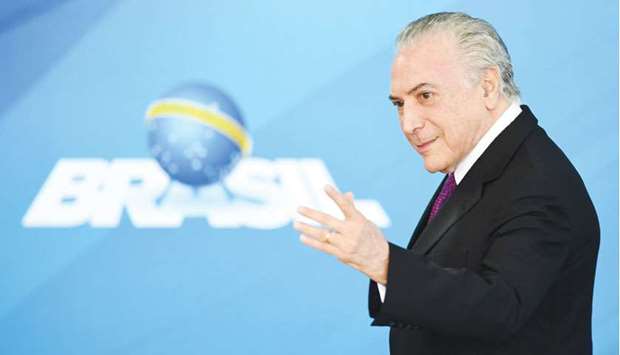A congressional committee voted 39-26 on Wednesday to reject charges against Brazilian President Michel Temer stemming from a corruption case involving the world’s largest meatpacker.
The full lower house of Brazil’s Congress still must vote on the charges but is expected to shelve them next week, sparing Temer from trial by the Supreme Court for alleged obstruction of justice and membership in a criminal organisation.
Temer was accused of taking bribes and condoning the payment of hush money to a jailed politician in testimony by meatpacker Joesley Batista.
Temer has denied any wrongdoing and his lawyers argued that the case against him was flawed because it was based on an inconclusive recording that Batista secretly made of a conversation with the president.
The lower chamber decides whether a Brazilian president can be put on trial.
Two-thirds of its members must vote to approve a charge for it to move forward, a hurdle his opponents are not expected to clear.
Temer survived an earlier corruption charge in the lower house in August in connection with the same graft scheme in which prosecutors accused him of arranging to receive a total of 38mn reais ($11.8mn) in bribes from JBS SA.
In committee debates on Wednesday, opposition Congressman Alessandro Molon, of the centre-left party called Sustainability Network, said that Temer was part of a criminal organisation that collected bribes.
He accused the president of taking part in decisions on how the money was distributed.
Workers Party lawmakers called for Temer to stand trial, saying that the charges against him were more serious than those levelled at his predecessor Dilma Rousseff, who was impeached last year for a lesser crime of violating budget rules.
But Temer’s allies argued that the charges should be thrown out because the country needs Temer to serve out his mandate through the end of 2018 for political and economic stability.
They said Temer has recovered Brazil from its worst recession, brought inflation under control, restored the purchasing power of Brazilian consumers and should stay in office to recover investor confidence.
Presidential aides said Temer will now be able to get on with his economic policy agenda focused on boosting weak growth and bringing a bulging government budget deficit under control.
The political capital and time Temer has spent defending himself, however, has delayed approval of a crucial overhaul of the pension system, the main cause of the fiscal deficit that cost Brazil’s its investment-grade credit rating in 2015.
Temer will be hard pressed to get the unpopular pension bill approved before the 2018 election year starts and promised reform of Brazil’s burdensome tax system might is now unlikely.

Temer: aides said the president will now be able to get on with his economic policy agenda.
